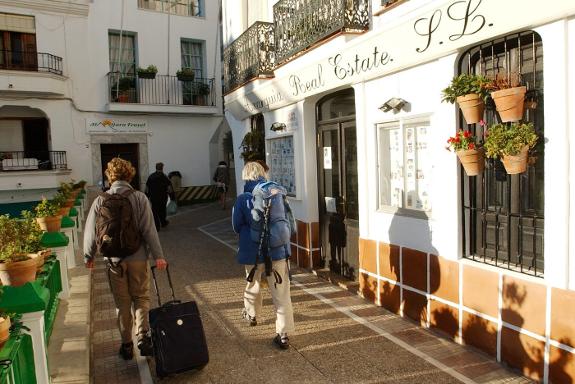

Sections
Highlight

Ivan Gelibter
Friday, 25 October 2019, 08:11
Compartir
More than three years after voters in the United Kingdom decided to leave the European Union, British residents in the province of Malaga are increasing in number, at least according to the official figures. This is the first time that the number of residents has increased after six years of decline, statistics that have been put down to the approaching Brexit.
According to figures from the National Statistics Institute (INE - Instituto Nacional de Estadística), at the start of this month 47,193 British nationals were registered on their local town hall population census (padrón) in the province of Malaga, far from the 76,931 residents registered in 2013. The gradual exodus of British residents since then and until now had been blamed on the fall in Sterling and increase in rental and property prices, especially on the Costa del Sol, among other factors.
From 2016, after British voters chose to leave the EU in the referendum, the numbers continued to fall, the uncertain future after Brexit boosting reasons for leaving.
Now though, it is that same uncertainty over future rights and status that has helped reverse the trend, as Britons who choose to stay in Spain get their paperwork in order.
The biggest increase has been noted in Mijas, where the British make up more than ten per cent of the total population. Of the 8,865 British residents registered in the municipality, 324 have joined the padrón in the last two months.
Council sources say they hope a large part of the unregistered, floating population will join the census over the next few days or weeks when the outcome of Brexit becomes clearer.
"We continue to work very closely with associations of British residents and with the consulate to try to respond to the uncertainty that British residents in Mijas are suffering," said Josele González, the mayor of Mijas. González went on to say that the welfare of British residents would not be ignored as municipal services would continue to be provided to residents on the padrón.
"Some families chose to live in our town more than 20 years ago, they have formed families here, opened businesses here, and we can't leave them stranded," said the mayor.
More than half of the British residents in the province are concentrated in Mijas, Fuengirola, Benalmádena, Estepona and Marbella - on the coast - and Alhaurín el Grande inland. In Fuengirola, where the trend has also been reversed in the last year with more than 200 new names on the padrón, the authorities are pleased that more residents are coming out of the woodwork.
"It's a satisfaction that, faced with a situation such as Brexit, many of the British citizens who have been living in Fuengirola for years have decided to stay here and join the census, instead of fixing their official place of residence in the country of origin. This is a sign that they are happy here and have a high quality of life and welfare," said the Foreigners councillor at Fuengirola town hall, Rodrigo Romero.
The Statistics Department in Fuengirola has said that it is "very significant" that many of the British nationals who have joined the local padrón in the last year had already been living in Fuengirola for more than four years. "In other words, it does appear that Brexit has had an effect," said a source.
Malaga city does not have a very significant proportion of British residents compared with the coastal resorts, however, with around 800 Britons on the population, the trend has also changed. According to the city councillor for Finance and Tax, Carlos Conde, the figure gradually fell between 2016 and 2018, but this year has seen an increase.
Transition period
Joining the padrón, however, is only one of the likely requirements British residents will need to meet after Britain leaves the EU.
Current residents are being urged now to clarify their situation before Brexit by applying for an EU residency certificate from their National Police station. The central government's representative in Malaga province, María Gámez, said that in recent months the number of British residents applying for this certificate (a green card or paper) has increased.
Anne Hernández, president of the association Brexpats in Spain was please to hear that the numbers of padrón registered residents had increased.
"It seems that finally people are starting to take notice of us. We have been telling our compatriots since 2016 that they have to start sorting out their papers, although the majority took no notice. This change in trend is good news," she said.
Meanwhile, as Brexit is still being debated in London and Brussels, Brexpats continues its awareness campaigns, answering residents' questions which are "always the same", said Hernández.
Last Saturday, Brexpats in Spain handed over a petition to the British government. Their request is simple: "That, despite everything, they don't forget about us and protect our rights," she said.
Publicidad
Publicidad
Publicidad
Publicidad
Reporta un error en esta noticia
Necesitas ser suscriptor para poder votar.